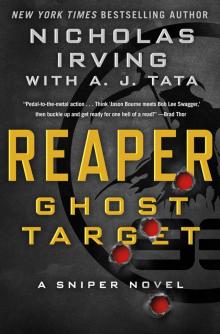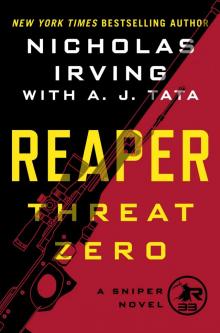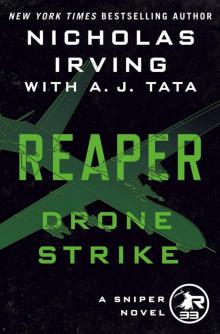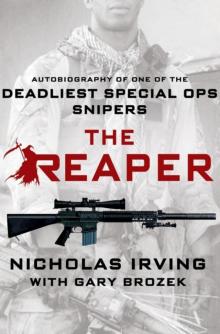- Home
- Nicholas Irving
Threat Zero Page 13
Threat Zero Read online
Page 13
This mission was filled with dilemmas. Killing the family members of terrorists. Stealing a peasant’s boat.
A noise from the sea broke his reverie. He scanned through his scope until he found the dim white light of a boat. It was a low vessel with a covered console and machine gun on the deck, definitely more modern than the fishing trawlers that inhabited the pier. As the vessel turned toward the docks, there were two armed men on the deck laughing as they held a woman by her long black hair. Her head was turned up in defiance and her hands were bound behind her back. She was wearing a brown peasant’s dress that appeared ripped and wadded near the hem. The men wore olive uniforms and had AK-47s strapped to their chests. The men’s laughter and voices tumbled over one another, drowning out the woman’s sobbing. The tears and contorted mouth were all Harwood needed to see. Images of his favorite foster sister, Lindsay, escaped from their locked compartment and floated through his mind. Abused, used, and ultimately killed by a sexual deviant, Lindsay had encouraged young Vick to run as far as he could from their foster home in Maryland. Tired of seeing his sister pimped out by scheming foster “parents,” Harwood had gone into the barn that fatal day. The old man was trying to rape her, and as she resisted, the man shot her.
Harwood’s instinctive reaction had been to grab the pitchfork as he emerged with rage from his hiding spot. The next thing he knew he was standing over the man and the pitchfork was pinning his throat to the dirt floor. Blood was everywhere. He checked on Lindsay, who was dead. He looked back at the man, who was also dead. Then he ran. At sixteen, he didn’t know where he was going, but he knew one thing.
The Reaper had been born. And he was on the run.
A light came on in the third shack from the general store. Harwood took a step back and assumed the prone position, aiming his rifle along at the pier. A man stepped from his front door and ran toward the pier. He was carrying something in his hand, which Harwood guessed was a pistol. Harwood moved the scope back to the boat. The man’s footsteps rang loud as they slapped onto the pier. The letters on the side of the boat were written in Farsi or Arabic, Harwood wasn’t sure. But it was clear this was a government ship of some type.
The boat was docking at the T-head of the pier. Harwood counted the one man at the helm and the two guards outside of the control room. The vessel didn’t appear to have any space belowdecks, but he couldn’t discount it. There were three antennae poking from the ship and as the boat crabbed next to the pier, the mounted DShK machine gun became more evident. Harwood guessed this was a coast guard patrol ship.
The man stopped on the pier when one of the guards held up his rifle and the other put a knife to the young girl’s throat. From the house, a door slapped against the frame sounding like a gunshot. A quick glance showed a woman pulling a robe around herself and looking at the pier.
Mother at the house. Father on the pier. Daughter on the boat.
Harwood put his crosshairs on the man with the knife, his head like a pumpkin in the scope. He squeezed the trigger. The weapon coughed, louder than he wanted, but the silencer helped dampen what would otherwise be a bellowing echo down the valley and onto the sea. The man dropped the knife and fell inside the boat.
Quickly, Harwood was on the second guard, who was holding the rifle. He shot center mass and scored a hit in the man’s chest. Double tapped him to make sure. The rifle fell with a splash into the water.
The apparent father turned and looked in Harwood’s direction. He was invisible, concealed beyond recognition, unconcerned about detection. Harwood already had his crosshairs on the door, waiting for the man to step outside. The window was open but did not provide a good shot. Human instinct and curiosity being predictable, the man came running out with his weapon up. He stared at the two dead guards.
Harwood exhaled deeply, squeezed the trigger and delivered a bullet to the man’s forehead. He waited five seconds for any further reaction from inside the boat. He knew he had a small window of time to move.
The daughter was trembling, her mouth open in a silent scream, as her father rushed toward her. The pain and anguish on her face caused Harwood to look up from his scope, look away. He’d seen too much pain and agony in his life. Why did it continue? He was doing his part, he considered, to stop it where he found it.
The father rushed forward and lifted his daughter over the boat’s gunwale. The mother ran toward the pier. Lights were coming on in the tightly packed community. Harwood was up and running toward the pier. His rucksack felt like it had a concrete block in it. The SR-25 swung awkwardly in one hand as he pumped for speed with the other. As he passed the main street into the village, people were stirring in their homes behind curtained windows. The police state might work to his advantage, keeping the downtrodden villagers in their homes for just a minute longer.
His boots slapped on the pier as he raced toward the family. Moonlight was the illumination. The pier had some naked bulbs hanging from wooden poles and connected by black electrical cables, but they were either turned off or nonfunctioning.
The man lifted his pistol and shouted at Harwood, who spoke no Farsi and understood a few words. He was dressed in a thin white T-shirt, dark slacks, and brown shoes with rubberized soles. He had black hair with flecks of gray. His face was broad and wizened, eyes narrow and suspicious.
Harwood stopped, feeling the peering eyes from behind the curtains a hundred meters to his rear. The father held his daughter close with his left arm and leveled the pistol at Harwood’s gut. He eyed Harwood’s SR-25 then looked over his shoulder with a quick glance. The wife held tight to her husband. Harwood could only imagine what the family was seeing: a grimy, black man wearing black cargo pants and shirt with black rucksack pulling at his shoulders. A rifle in his left hand and his right hand free to either draw his pistol from his hip like an old-style Western gunfight or draw the knife attached to the webbing of his outer tactical vest.
He held his right hand up, palm out, the universal signal for stop, listen, or don’t do what you’re thinking about doing.
The man’s eyes flicked from Harwood to the village. Something was happening behind Harwood but he didn’t chance taking his eyes off the father. Harwood said, “We have to hurry. They were going to hurt her more.” He pointed at the boat.
The father nodded, as if he understood. He seemed to go through a series of quick mental calculations that Harwood suspected included saved my daughter, risked his position, three dead Iranian government types, trouble for the village.
“Quick,” the man said. He kissed his daughter on the top of the head. She was maybe fourteen now that Harwood got a closer look at her pained countenance. Then he switched positions with the daughter, handing her to the mother. He said something to the mother, who nodded. The girl’s eyes remained fixed on Harwood. “With me,” the father said as he tucked the pistol in his belt. He waved his hand at Harwood and walked quickly to the boat, which had remained adjacent to the pier, despite having no lines tied. Harwood followed the father over the gunwale and stepped over his fresh kills. The boat deck was slick with blood, causing him to almost slip. Once he was in the back of the boat, he looked at the mother and girl, who had turned to keep her frozen stare on Harwood.
She mouthed the words, “Thank you,” as her father fired up the boat.
Harwood nodded. The girl carefully lifted her hand and opened and closed her palm, extending her fingers in a muted wave goodbye.
After ten minutes of heading due north into the Caspian Sea, the father said, “Where?”
Harwood thought about the note again. Baku was the place, but where in Baku? He wasn’t sure he wanted to give away his destination to someone who could be captured and tortured by the Iranian police.
“You speak some English,” Harwood said. “I don’t speak Farsi.”
“It’s okay. Some English. Where?”
“Baku,” Harwood said.
“Azerbaijan?”
“Yes.”
The man considered it, looked at the gauge
s, and then at Harwood.
“It’s a long way. Over two hundred kilometers,” the man said. He paused, looked at Harwood and continued. “You saved Fatima. It’s okay.”
Harwood nodded. “Thank you.”
The father played with the gauges for a bit as Harwood began collecting weapons and information from the Iranian government officials. Each man had an AK-47 and Makarov pistol. They carried identification, which Harwood pawed through more out of combat instinct than needing any useful information from Fatima’s captors.
“No. Don’t touch,” the father said. “Here. Steer boat.”
Harwood switched places with the father, each understanding that trading names was not a good idea. Looking through the windscreen, Harwood saw the black expanse of the evening and ocean spread infinitely before him. The boat’s hull slid smoothly across the glassy sea. He rested his hand atop the wheel but felt it correct on its own. It was on autopilot. The GPS was not unlike Google Maps or some other map function save the Farsi characters as opposed to English he was accustomed to. The destination wasn’t precisely Baku, but some point close, according to the map and the charted course, which was displayed by a single straight line. The boat was traveling at thirty knots.
The noise behind him distracted him enough to cause him to look. The father had a large knife out and was slicing open the abdomens of each man, working his hand way up inside the chest cavity. He came out with a large organ and tossed it over the side like chum.
“Lungs. Make them sink,” the father said, looking up at Harwood, who nodded.
The father was a hard man. A fisherman, used to a hard living. He wanted no trace of him or the guards left behind. He was repaying a debt to Harwood and would then disappear, Harwood surmised. When the father was done removing the lungs of each man, he tossed the corpses over the edge. The man found a broom and began sweeping the blood into the well.
When he was done, the father stepped up and nudged Harwood out of the way.
“This is Zolfaghar. Fast,” he said, then pushed the throttle all the way down until it was pressing against the housing. “Seventy knots.”
Standing inside the control room of the vessel, Harwood placed his right foot back and braced himself against the frame. The bow lifted into the air and the boat spat a giant rooster tail as it rocketed north.
Harwood used the smooth ride and apparently trustworthy father as time to focus on personal maintenance. He first found a portion of the deck not covered in blood where he stripped and cleaned his weapons. He dug through his rucksack and reloaded his magazines with 7.62 mm ammunition. He emptied and repacked his rucksack, making everything tighter. He found the scraps of a bonus MRE he had stashed in the bottom and wolfed it down. Lastly, used some moist wipes to clean the grime off his body where he could. He stuffed the wipes and MRE wrappers in the MRE bag, rolled it, and jammed it into his rucksack. His hand hit something circular and small. He studied the tracking device and tossed it overboard. Then he fell asleep.
He dreamt of firefights in Afghanistan with Corporal Sammie Samuelson lying next to him, saying, “Send it.” His unblinking focus on the target. Samuelson’s reliability, albeit new to him as a spotter after the Chechen had killed Joe LaBoeuf. Long conversations about nothing and everything as they lay motionless for hours, sometimes days, in the same hide position, waiting for that one shot that would make the difference. Lots of conversations. Some professional, most personal. Samuelson was from Texas. His parents divorced when he was young. He’d lived with his father. Wasn’t close with his mother, but they visited some. In the divorce apparently Samuelson’s parents had divided property and children, because Harwood’s mind pulled out a memory about a sister and ran it through the dream filter. The parents were standing tall above the children, who were staring at each other. As they began to speak, Harwood’s dream floated to his own childhood. He was a spectator on everyone’s family because he didn’t have one of his own. A foster kid who had run away and joined the army, which had been exactly the right thing to do.
The boat slowed and shifted so that Harwood awakened. He cradled his rifle as he leaned against his rucksack. He’d slept maybe an hour.
“Here. Quick,” the father said.
Harwood stood and let his eyesight adjust from the back of his eyelids to the early morning darkness. Scattered lights sprinkled in the distance. To his right was the sea, but to his front and left were buildings etched against the night skyline, black on black.
“City that way,” the man pointed across the bow. “Out now.”
“Roger. Thanks,” Harwood said, staring into the man’s eyes. The father nodded. They were even. Harwood hoped he made it back to his daughter. Surely, he’d have to refuel and then ditch the boat somewhere before he got back to Iranian waters. Not his problem.
The boat shimmied to the side of what looked like an old T-head pier for offshore oil or liquid loading and unloading. Harwood disembarked onto the narrow concrete platform and the attack vessel silently slipped away into the night. Harwood followed the three-foot-wide maintenance walkway across nearly two hundred meters of water before reaching land. He found a low ditch paralleling a north-south road. By his calculations he was three miles south of the city to the north, which he assumed was Baku. A few oil rigs pumped rhythmically with their cantilevered arms in the distant foothills. The area had an unnatural smell of salt water and industrial by-product that he couldn’t quite place.
Picking his way along the ditch, the occasional car would rumble toward or from behind him, whereupon Harwood would lay prone and motionless until he was convinced he could proceed without detection.
Unclear on where exactly he was going once he got to Baku, Harwood replayed his last conversation with Hinojosa in his mind. They had not discussed CIA safe houses, the U.S. embassy, or any other logical meet-up locations. She’d slipped the paper into his pocket without mentioning it to him, meaning that she was worried about others listening in on their conversation. Perhaps it was something coded?
They had discussed the Sultan raid and the legitimacy of the Perza raid. After some back-and-forth, she had informed him that Samuelson was a key suspect in the Camp David Ambush. Then they’d discussed Carly Masters and what, if any, role she’d played in this matter. After some tense words, they’d then hugged when she slipped the paper into his pocket.
The conversation had flowed logically from one topic to the next. He’d been preoccupied thinking about Samuelson, but he remembered there was an anomaly in the conversation. Something about a damsel in distress. It didn’t fit with everything else they had been discussing.
Won’t be rolling my hair from some medieval tower.
It was the only thing he could think of, the only seemingly misplaced comment. Her voice had seemed tense and her demeanor uncharacteristically awkward. Even the hug. It felt … forced. She needed to be close to him to whisper in his ear and slip the paper into his pocket.
The only geographical reference in the conversation other than target locations had been a medieval tower. Was there one in Baku?
Convinced that Hinojosa had been too precise and professional in her conduct and communications to have a random statement slide into the conversation, he continued along the most covered and concealed route to the city. The tall buildings etched against the skyline hinted that the city was not some former Soviet Republic backwater, but a modern metropolitan area. The road ten meters to his left was elevated, affording him an avenue of dead space in which to walk without being spotted by drivers. To his right was the Caspian Sea. He knelt to get his bearings near a bundle of washed up driftwood. He disassembled his SR-25 and carefully packed it in his rucksack. Transitioning from soldier on the run to “peaceful hiker” was probably his best option. He scraped through the driftwood and picked up a four-foot walking stick that was maybe three inches in diameter. He lifted the edge of his black polypropylene shirt over his pistol, giving it a nudge for reassurance now that the comfortable heft of the SR-
25 was in his ruck. He removed and stuffed his outer tactical vest beneath the top flap of his rucksack.
He soon came upon a sprawling beach with chairs and umbrellas already in place for a May beach day. The road veered away toward the inner city, giving way to a series of hotels and restaurants above the seawall. Harwood scraped his left shoulder against the wall, and continued forward, poking the stick in the sand on every other step of his left foot. Scanning now, he was more alert for threats, despite his exhaustion. The hour or so of sleep he’d managed helped, but not much. The sun was probably two hours from nudging over the edge of the sea to his right. He was at his circadian rhythm ebb and he knew it. The soft sand was inviting, for sure. He could lie there, take a nap, and let the sun serve as an alarm clock. He had no idea about the homeless population in Azerbaijan or Baku specifically, but considered that as one disguise option.
Voices to his front caused him to stop. He retrieved his night-vision goggle and held it to his eye like a pirate searching for land. About twenty meters to his front was a male and female couple having sex on a blanket in the sand near the water. The man was on top, holding the woman down, her legs wrapped around his back. Probably some nightclubs just closing down in the area.
He pressed ahead, betting they were both too inebriated and consumed with desire to bother with him. He was right. Their voices faded in the background as he continued another half mile by his own pace count. The lights from the hotels and commercial district were bright enough to cast a skidding yellow reflection off the Caspian Sea, which was lapping against the otherwise uninhabited beach twenty meters to his right. As he walked, the beach transitioned to bulkheads and industrial port facilities. He had to dodge a couple of fences and walk a few tightrope-like concrete piers until he passed a dormant amusement park on his right. The city was an eclectic mix of resort and industrial.
Was there a medieval tower?
The night was blessedly in that temperature range that was both cool and warm enough to be comfortable. Still, he was sweating and another hour into his fatigue when a rank smell pushed outward from a culvert at the base of the wall. Had to be a sewer of some type. The fetid odor propelled him forward until he found a staircase, which he climbed to the point he could see over the lip of the boardwalk and road beyond. A few cars sped in either direction. The boardwalk was empty save a few bums sleeping on scattered benches. The amusement park’s towering structures seemed out of place behind him, though, as he studied a series of canals and roads that separated the city from the sea.

 Ghost Target
Ghost Target Threat Zero
Threat Zero Reaper: Drone Strike: A Sniper Novel
Reaper: Drone Strike: A Sniper Novel The Reaper: Autobiography of One of the Deadliest Special Ops Snipers
The Reaper: Autobiography of One of the Deadliest Special Ops Snipers